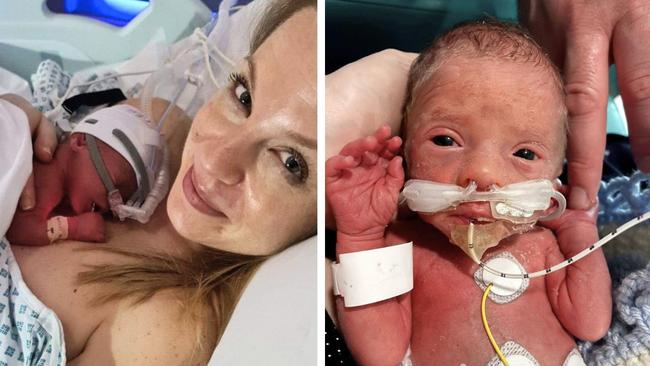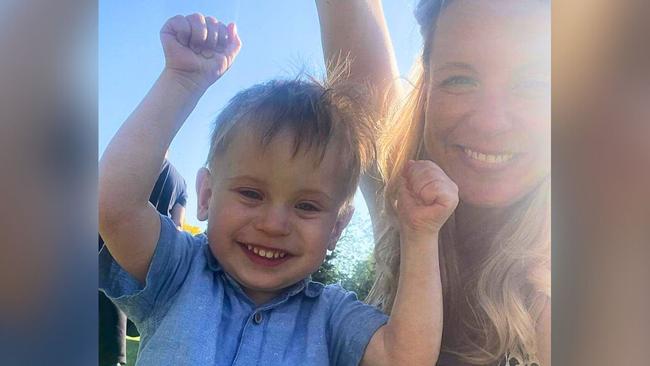The notes said: 'If the pregnancy continues, we'll see her in two weeks’
"What did 'if' mean? Now I wasn’t sure that I would ever meet my first child," Aussie mum Hannah writes for Kidspot.
Baby
Don't miss out on the headlines from Baby. Followed categories will be added to My News.
"You’re measuring a bit small," the sonographer told me at my 20-week scan.
It was as vague as that to begin with. But after a swift referral to fetal medicine, a conversation with a poker-faced specialist and a box of tissues later, I wasn’t sure that I would ever meet my first child.
I had been diagnosed with Intrauterine Growth Restriction (IUGR), or Fetal Growth Restriction (FGR) as it’s more commonly known today – both much better options than the former Intrauterine Growth Retardation label that preceded it.
FGR is a little known, but surprisingly common, condition given to babies measuring below the 10th centile who aren't growing at the expected rate during pregnancy. In some cases, it can be associated with such challenging outcomes as stillbirth, neurodevelopmental issues or ongoing growth restriction.
My baby was below the 1st centile and therefore considered severe FGR. As one clinician anecdotally explained, I had a one in three chance of my son surviving, one in three that he would be impaired in some way and one in three that he would be perfectly fine.
It’s not the kind of conversation you expect to have at such a critical moment in pregnancy.
I was referred to a team of maternal fetal medicine (MFM) specialists who monitored me throughout my pregnancy. But after the first appointment it became apparent that they didn’t like my chances.
The specialist recorded in my notes: "If Hannah’s pregnancy continues, we’ll see her in two weeks." Reading their crude analysis at an impressionable 21-weeks pregnant felt like I had been emotionally winded.
If? What did they mean, "if"?

RELATED: Nobody tells you this after having a premmie baby
"My anxiety was in chronic overdrive"
The conversations became more difficult as my pregnancy progressed. Every two weeks my son’s growth was measured and his vitals monitored.
FGR is usually caused by placental, fetal, maternal or genetic factors, but there isn’t always an identifiable explanation – it’s just something that happens sometimes to some people. Unable to pinpoint my cause (although placental insufficiency was highly suspected), I was investigated for other alternatives like chromosomal abnormalities which added a new layer of complexity that I hadn’t considered. In the weeks that followed I destructively Googled the ‘what ifs’ late into the night, sending my anxiety into chronic overdrive.
But my little boy was a fighter and his resilience over the next 11 weeks proved how tenacious he was. Although his growth each fortnight was small, it was anything but insignificant. I celebrated every gram as an achievement and each passing week as a monumental milestone.
"He was born healthy despite the odds"
Fortunately, despite the odds, my son was born perfectly healthy by emergency caesarean section – all 1.225kg of him. I was warned that he might not cry upon delivery because he would be so exceptionally tiny. But when I asked the anaesthetist narrating the medical wizardry behind the curtain: "Is he alive?", my son answered for him with a high-pitched whine I’ll never forget.
Hello to you too, gorgeous boy.
My son spent five weeks in the Neonatal Intensive Care Unit (NICU) where he learned to breathe on his own, monitor his temperature and eventually feed. Anyone who’s spent time in NICU will know that these facilities are remarkable feats of innovation and that we have a lot to be thankful for.
But at the same time, I felt a sense of dream-like disbelief as I snuggled my newborn while he was still wired to a machine.
This isn’t what you expect when you’re expecting.

RELATED: I delivered at 32 weeks and was shocked six months later
"It was nothing short of brutal"
While the outcomes of FGR will vary from family to family, its impact is rarely contained within the hospital. My son struggled with breastfeeding and a general lack of enthusiasm for solids once we began the weaning process. While he continued to put on weight and catch up on the centile chart, the growth remained slow, so I was constantly berating myself for never feeling like I was doing ‘enough’.
My son met most of his milestones with ease – especially fine motor and communication – but gross motor skills like standing independently and walking autonomously took a bit more time because of the delicate strength of his core. However within two years all major milestones were met, he continued to follow his growth curve and he was finally thriving.
Those early conversations and anxieties around FGR are nothing short of brutal. But for parents who find themselves facing a similarly vague and complex diagnosis, it’s important to know that these babies are full of resilience. As surprising as the diagnosis can feel, the unrelenting determination of our little fighters is the most surprising of all.
Being told you’re measuring a bit small might catch you off guard, but the cliché is true. Sometimes the most wonderful gifts come in the smallest of packages.
More Coverage
Originally published as The notes said: 'If the pregnancy continues, we'll see her in two weeks’




